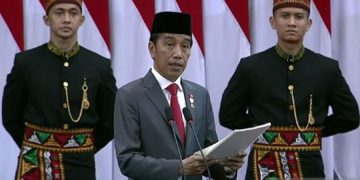ANTARA
President Joko Widodo (Jokowi) highlighted that Indonesia’s manufacturing and trade sectors clocked significant growth, as the national trade balance registered a surplus for 27 consecutive months.
“Strategic sectors, such as manufacturing and trade, have recorded expansive growth supported by the recovery of public consumption and high export performance. Our balance of trade has recorded surplus for 27 consecutive months,” the president noted in his state budget speech on the 2023 Financial Note and Draft State Budget at the Parliament Complex, here, Tuesday.
Indonesia has been successful in addressing the COVID-19 pandemic and bringing about national economic recovery in a relatively short period of time, he pointed out.
“Indonesia’s economic recovery continues on a strengthening trend. It has grown by 5.01 percent in the first quarter and grows significantly to 5.44 percent in the second quarter of 2022,” the president pointed out.
The recovering manufacturing sector has become the driver of national export performance, he said, adding that the achievement is a testament to the success of the industry’s downstream strategies implemented since 2015.
“The high export performance is also supported by the mining sector due to the increase in commodity prices at the global level,” Jokowi remarked.
Moreover, the transportation and accommodation sectors, despite being severely affected by the COVID-19 pandemic, also recorded growth of 21.3 percent and 9.8 percent respectively in the second quarter of 2022, he noted.
“Indonesia’s inflation rate is still more moderate than other countries. As per July, Indonesia’s inflation rate was only at 4.9 percent (YoY), and this is due to the state budget’s contribution to maintaining the stability of energy and food prices,” the president remarked.
Despite the positive economic performance, Jokowi highlighted the need to remain cautious over possible factors that may derail the progress.
“The global economic fluctuation risk is still high. The global economic downturn still potentially affects the short-term domestic economic growth,” he stated.
He pointed out that geopolitical conflicts, particularly the Russia-Ukraine conflict, cause disruption of the global supply chain and commodity price spikes are pushing inflation rates in various countries, including Indonesia.
The decision of central banks in various countries to aggressively tighten monetary policies also caused tremors in financial markets of developing countries, the president added.The decision of central banks in various countries to aggressively tighten monetary policies also caused tremors in financial markets of developing countries, the president added.





